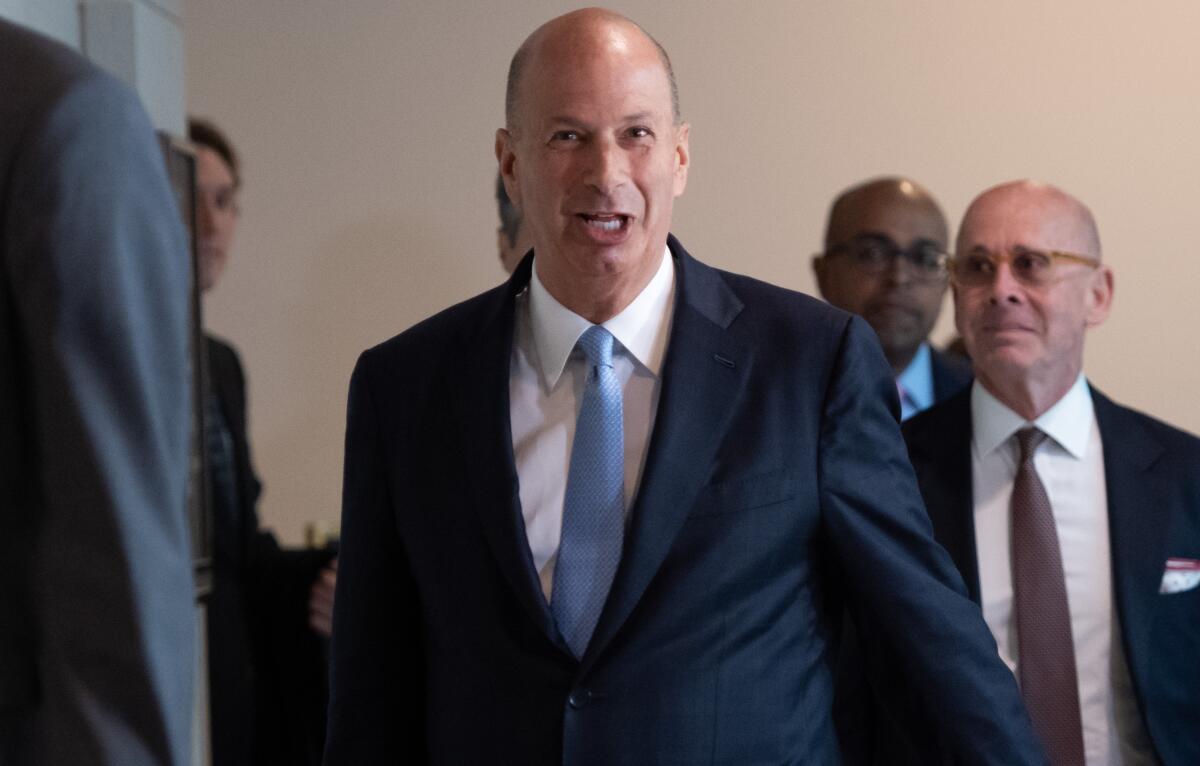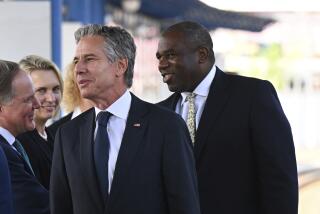Ambassador Sondland changes story, says he told Ukrainians that U.S. aid was linked to launching inquiry

- Share via
WASHINGTON — Gordon Sondland, U.S. ambassador to the European Union and a key defender of President Trump in the impeachment inquiry, revised his statement to House investigators, saying he now remembers telling a Ukrainian official that nearly $400 million in American aid would probably not be released unless the country publicly committed to conducting investigations that Trump wanted, according to documents released Tuesday by the House impeachment committees.
The original 10-hour Oct. 17 deposition by Sondland, a Trump donor, came under intense scrutiny in recent weeks as other impeachment witnesses offered testimony that seemed to conflict with what Sondland said under oath. Some lawmakers said it appeared Sondland committed perjury.
In a three-page declaration sent to House investigators on Monday, Sondland revised his earlier deposition, saying the other witnesses had “refreshed my recollection.”
Now Sondland’s version mirrors that of other witnesses who have described a quid pro quo linking release of the aid to Ukraine launching investigations that could help Trump in his 2020 reelection campaign.
His new account undercuts White House officials who have repeatedly pointed to Sondland’s testimony that he did not believe there was quid pro quo. And as one of the few impeachment witnesses so far who had direct access to Trump, Sondland cannot be dismissed as a so-called Never Trumper, a label Trump has used to discredit the testimony of other witnesses.
Sondland acknowledged in the supplemental testimony that “it was my understanding” that a White House meeting between Trump and Ukrainian President Volodymyr Zelensky as well as the release of the military aid was contingent on Ukraine’s agreeing to investigate unfounded allegations about that country interfering in the 2016 U.S. election and opening an inquiry into Burisma, a gas company that employed the son of former Vice President Joe Biden, one of Trump’s potential 2020 rivals.
Sondland also changed his testimony to include a Sept. 1 conversation with Zelensky’s top aide, Andriy Yermak, in which Sondland told the Ukrainian that “the resumption of U.S. aid would likely not occur until Ukraine provided the public anti-corruption statement that we had been discussing for many weeks.” The anti-corruption statement specifically was to include a commitment to investigate the Bidens and Ukraine’s purported role in 2016.
Initially he told the House committees that before Sept. 9, he “could not recall” being aware that the aid’s release was contingent on an investigation by Ukraine.
During his Oct. 17 deposition, he also testified that demands from Rudolph W. Giuliani, Trump’s personal lawyer, “kept getting more insidious.”
House Democrats on Tuesday released transcripts of the full-day hearings of Sondland and Kurt Volker, former U.S. ambassador to NATO.
White House Press Secretary Stephanie Grisham said Sondland’s revised statement changes nothing because he acknowledged that he did not have any direct information about why the aid was withheld.
“Ambassador Sondland squarely states that he ‘did not know, (and still does not know) when, why or by whom the aid was suspended,’” she said, quoting from his revised statement. “He also said he ‘presumed’ there was a link to the aid — but cannot identify any solid source for that assumption,” she said.
The release comes as two White House officials — Wells Griffith, senior director for international energy and environment at the National Security Council, and Michael Duffey, Office of Management and Budget associate director for national security programs — failed to appear for scheduled depositions Tuesday.
The investigating committees’ chairs also requested a deposition by acting White House Chief of Staff Mick Mulvaney on Friday, saying in a statement, “We believe that you possess substantial first-hand knowledge and information relevant to the House’s impeachment inquiry.” Mulvaney has already ignored a subpoena requesting documents, and the White House said Tuesday he will not attend.
“Past [Democratic] and Republican administrations would not be inclined to permit senior advisors to the president to participate in such a ridiculous, partisan, illegitimate proceeding — and neither is this one,” said White House Deputy Press Secretary Hogan Gidley.
Democrats’ impeachment inquiry focuses on the president’s demand that Zelensky investigate Biden and the 2016 election as Trump was holding up the congressionally approved aid.
Sondland also testified extensively about Trump’s insistence that he and other diplomats work with Giuliani before agreeing to a White House meeting with Zelensky. Sondland testified that he discussed Giuliani in “general terms” with Secretary of State Michael R. Pompeo, who “rolled his eyes and said: Yes, it’s something we have to deal with.” Sondland also testified that Pompeo “hit a brick wall when it came to getting rid of Mr. Giuliani.”
Since Sondland’s Oct. 17 testimony, some Democrats on the investigating committees have said his statements directly conflicted what they have been told by multiple other witnesses. Intelligence Committee member Rep. Joaquin Castro (D-Texas) tweeted last week that “based on all the testimony so far, I believe that Ambassador Gordon Sondland committed perjury.”
In Sondland’s initial testimony, he portrayed himself as an unwitting player who thought Giuliani and Trump wanted proof that the new Ukrainian president would fight corruption in general. He said that he didn’t understand what their references to 2016 and Burisma meant and didn’t seek clarification. Asked by one lawmaker whether he thought any attempts by Giuliani to pressure Ukraine to investigate the Bidens or get involved in the 2020 election would be illegal, Sondland said, “I’m not a lawyer, but I assume so.”
Sondland, who has little prior foreign policy experience, is seen as an ally of the president, while other witnesses have been career foreign service workers or federal employees.
Volker, a longtime foreign service officer, abruptly resigned a week before his Oct. 3 testimony, and was the first person to testify behind closed doors.
Volker told lawmakers that Giuliani had amplified “a negative narrative” about Ukraine corruption that made Trump resistant to the possibility that Zelensky was serious about reform and prejudiced Trump about Ukraine long before his fateful July 25 phone call.
Shortly after Zelensky’s May inauguration, Volker described how he, Sondland and Energy Secretary Rick Perry briefed Trump and encouraged him to meet with the country’s new president. But Trump, Volker recalled, told them that he’d heard from Giuliani that Zelensky has “some terrible people around him” and seemed to believe a debunked claim that Ukraine had attempted to influence the 2016 presidential election in order to help Democratic candidate Hillary Clinton. “They tried to take me down,” Volker recalled Trump saying.
In early August, when Ukraine was considering issuing the statement about rooting out corruption, Giuliani’s insistence on a specific reference to Burisma ultimately killed the statement, Volker said.
“It was Mr. Giuliani who said: ‘If it doesn’t say Burisma and 2016, it’s not credible,’” Volker told lawmakers.
Because there was no formal request for such an investigation and because explicitly referencing Burisma would, Volker said, “play into our domestic politics,” he and Yermak, Zelensky’s aide, agreed that making a statement wasn’t appropriate.
Other witness transcripts were also released Monday as Democrats move toward the public phase of their impeachment inquiry, with public hearings conducted by the House Intelligence and Judiciary committees likely in the coming weeks.
More to Read
Get the L.A. Times Politics newsletter
Deeply reported insights into legislation, politics and policy from Sacramento, Washington and beyond. In your inbox twice per week.
You may occasionally receive promotional content from the Los Angeles Times.












